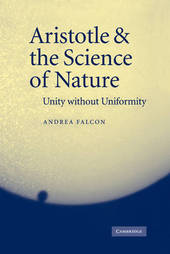
|
Aristotle and the Science of Nature: Unity without Uniformity
Hardback
Main Details
| Title |
Aristotle and the Science of Nature: Unity without Uniformity
|
| Authors and Contributors |
By (author) Andrea Falcon
|
| Physical Properties |
| Format:Hardback | | Pages:160 | | Dimensions(mm): Height 236,Width 160 |
|
| Category/Genre | Western philosophy - Ancient to c 500 |
|---|
| ISBN/Barcode |
9780521854399
|
| Classifications | Dewey:185 |
|---|
| Audience | | Professional & Vocational | |
|---|
|
Publishing Details |
| Publisher |
Cambridge University Press
|
| Imprint |
Cambridge University Press
|
| Publication Date |
8 September 2005 |
| Publication Country |
United Kingdom
|
Description
In recent years the study of Aristotle's philosophy of nature has taken a new direction, under which Aristotle is shown to have regarded the natural world, and its study, as having a clear structure. Andrea Falcon explores this new direction in order to present an accessible examination of Aristotle's philosophy of nature. He shows that Aristotle, while systematically investigating nature, also recognized the limitations of natural science. Aristotle insisted that the celestial world is radically different from the sublunary world and that there is an important discontinuity between both worlds. This book explores the source of the discontinuity and argues that Aristotle's conviction that the natural world exhibits unity without uniformity ultimately led to his claim that the heavens are made of a special body, unique to them. Highly accessible and clearly-structured, this book is essential reading for all students of Aristotle's philosophy of nature.
Author Biography
Andrea Falcon is Assistant Professor in the Department of Philosophy at Concordia University, Montreal. He is the author of Corpi e Movimenti: Il De caelo di Aristotele e la sua fortuna nel mondo antico (Naples, 2001).
Reviews'... [a] tightly argued monograph on Aristotle's Meteorology ... Falcon's excellent study has relevance to both Aristotle scholarship and contemporary concerns.' British Journal of the History of Science 'The book is tightly argued and situates Aristotle's arguments in the historical tradition of commentary upon his work in a clear and highly sophisticated fashion. ... It should be of great interest to advanced undergraduates and others who are interested in a highly engaging and important account of Aristotle's understanding of the science of nature. ... F. has offered up an extremely compelling set of tightly linked arguments showing that Aristotle's position on the discontinuity between the sublunary and celestial worlds has wide ranging implications for the integration of sciences such as biology and meteorology and for how Aristotle understands the "system " of nature as a whole. ...This book will be of interest to those wishing to gain a greater understanding of how Aristotle's philosophy of science is situated historically - as I have stated the historical context provided with respect to doxographers and ancient commentators is outstanding ... the footnotes are extensive and filled with references to a good deal of recent work related to Aristotle's conception of science. Bryn Mawr Classical Review
|